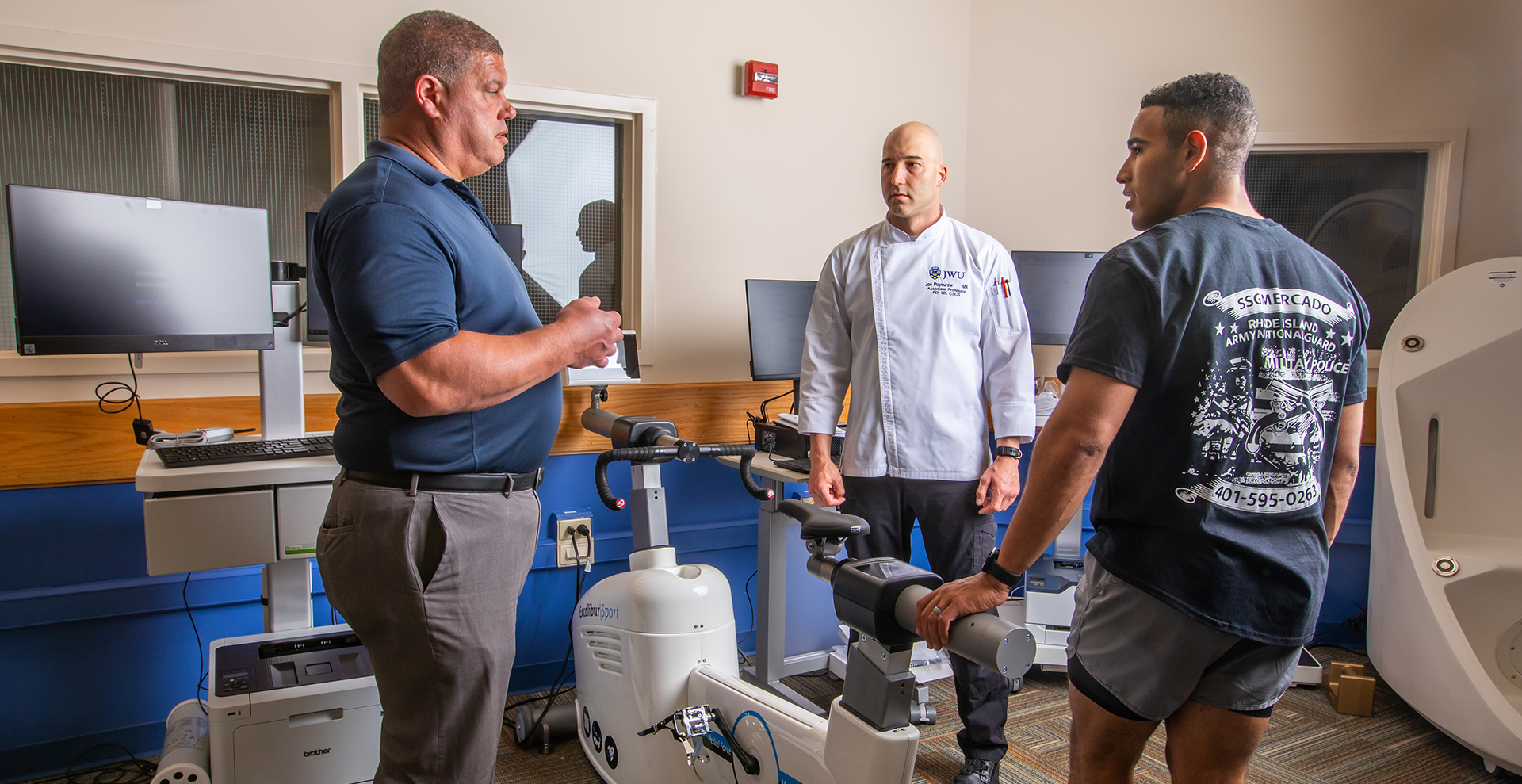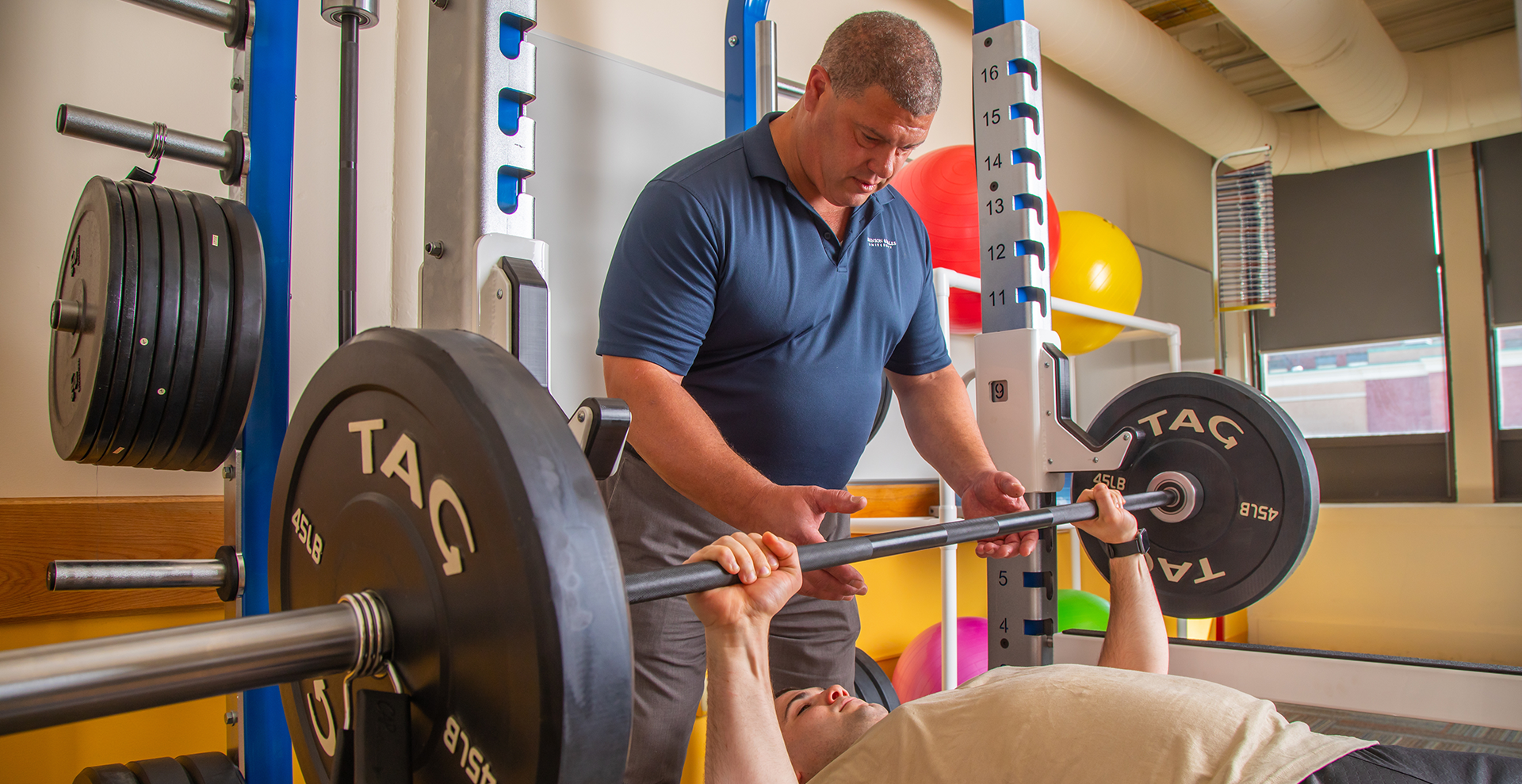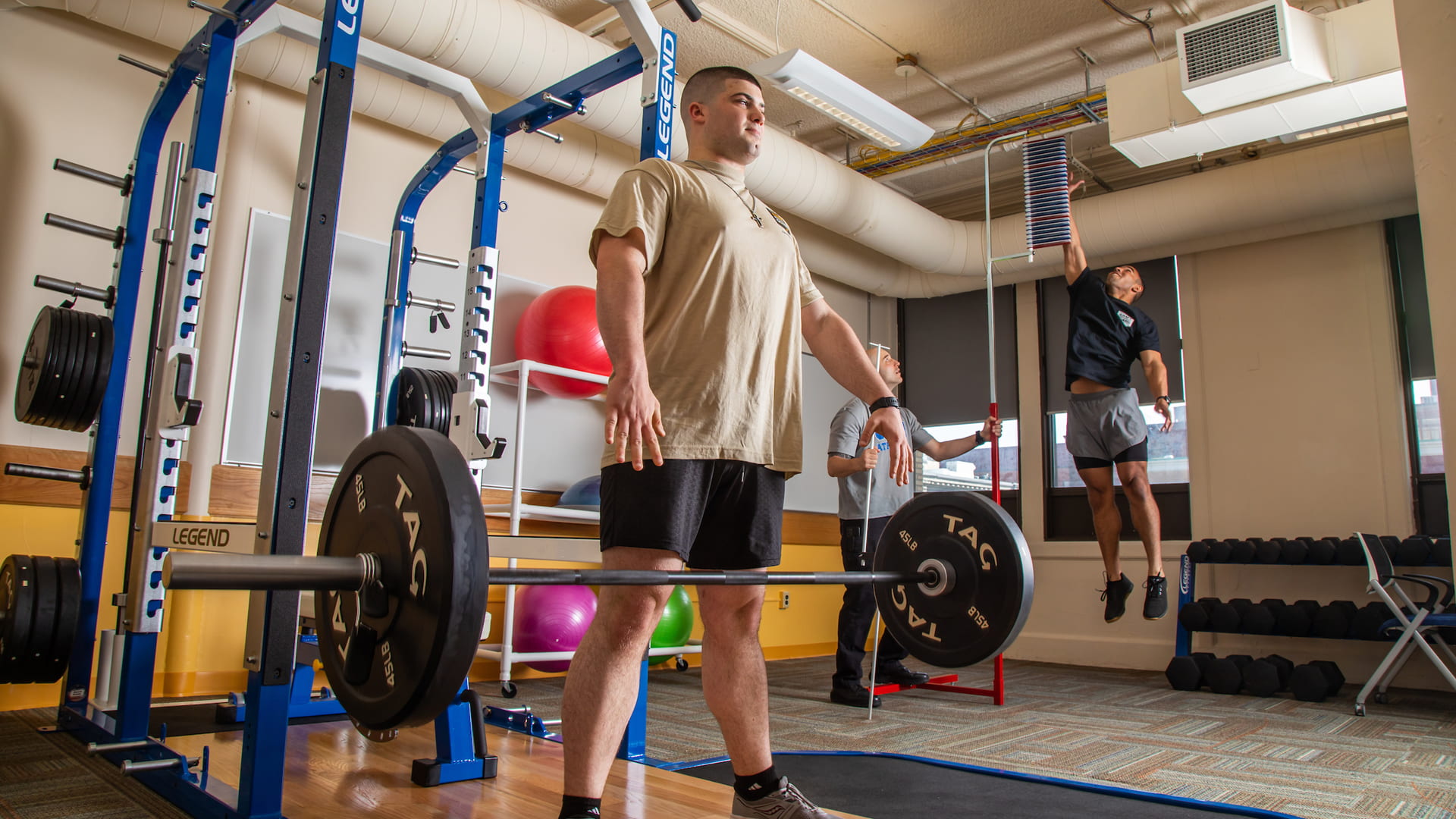JWU’s new Exercise Sports Science Hub brings state-of-the-art technology to the College of Health & Wellness
A pod that measures body mass index. A treadmill with a harness that can accommodate Olympic-speed runners. A system used by the National Football League (NFL) to assess balance. A scientifically proven device to evaluate athletes for their risk of injury. All of this and more will be available to Johnson & Wales (JWU) students, faculty and researchers when the new Exercise Sports Science Hub at the College of Health & Wellness (COHW) opens this spring on the fourth floor of the Academic Center in Providence.
The new hub will promote interprofessional experiential learning for students across the College of Health & Wellness, including those in occupational therapy, dietetics and applied nutrition, physical therapy, health science and public health. Laura Galligan, Ph.D., dean of the College of Health & Wellness, says, “We are building a comprehensive college that attends to all the pillars of health. We're emphasizing the interdisciplinary and interprofessional connections between programs at the College of Health & Wellness (COHW) so that students can see how the same concept is applied in different areas. We also want to educate our students alongside the colleagues they will ultimately work with once they graduate. This approach will make our students nimbler and stretch them to see things from different perspectives, which enables them to be better clinicians and practitioners.”
Leading the hub
The hub is directed by Associate Dean Paul Ullucci, Ph.D., PT, who joined JWU last year after decades in higher education and private practice.
While directing a free clinic for the college community at Fresno State in California, he helped treat uninsured patients with a wide range of ailments, from farm-related injuries to strokes. “It was a pro bono clinic run by faculty and students, but we did about $750,000 worth of services a year,” says Ullucci, who then directed the Human Anatomy Lab at Sacred Heart University in Connecticut. He then returned to his home state of Rhode Island, where he became an associate professor, SARS-COV2 surveillance program administrator and program director for Bryant University’s School of Health Sciences Physical Therapy program.
Although it was a critical position, directing the COVID-19 surveillance clinic was not Ullucci’s true passion, so he was intrigued when Galligan called with a job proposition.
“Dean Galligan talked about the new degree in Exercise and Sports Science that launched last year and her vision to house the College on five floors of the Academic Center building to maximize interprofessional, experiential education. The idea of having five floors that can encompass occupational therapy, two levels of dietetics and undergraduate and graduate exercise sports science, all in one place, was exciting,” says Ullucci.
He loved the idea of having so much knowledge and expertise under one roof, the opportunity for students across disciplines to connect and collaborate easily from floor to floor, and the ability to work with students on research in cutting-edge labs.
“I've always been passionate about teaching and doing research with students. I love seeing students get jazzed about experiential learning because it’s much easier to absorb knowledge when you’re actually doing it. Then, when they assist on a research paper and get a national mention, their excitement is priceless,” says Ullucci, who has published multiple peer-reviewed articles with students, and whose research interests include the evaluation and treatment of concussion, whiplash injuries, chronic headache, TMJ, spine, manual therapy, injury prevention and reducing workers’ compensation costs for businesses. Ullucci and his students have also presented to physicians, athletic trainers, physical therapists and other medical professionals at a range of conferences.
The new hub will enhance opportunities for research, publication and knowledge sharing due to the state-of-the-art equipment and expanded data-collecting capabilities. Ullucci is personally interested in research topics such as supplement efficacy, how interprofessional learning affects student outcomes, and nutritional impact on athletes and the non-athlete population.
He explains, “The data is lacking on individuals who are not athletes or deep into fitness. The average person who hurts their back, for example, is not a 19-year-old football player, they are more likely to be a middle-aged day laborer. So, there’s a lot of low-hanging research fruit related to health and wellness for everyday life, and the new hub can help us tackle that and ultimately improve clinical practice.”
A glimpse into the Hub
Visitors to the Exercise Sports Science Hub arrive at 138 Mathewson Street and take an elevator to the fourth floor. Upon exiting, they are met by a hallway length collection of stunning black-and-white photos depicting athletes in fitness poses or engaged in sport, including a sprinter exploding off the block.
On the other side of the hallway are the Human Performance Lab and the Exercise Science Lab. Both laboratories serve as fitness spaces as well as modular classrooms in which the desks and tables collapse and move out of the way for exercise and activities. The entire hub has double redundancy wi-fi and multiple flat-screen monitors so lectures can be broadcast from one room to the other.

Associate Dean of the College of Health & Wellness Paul Ullucci PT, Ph.D., DPT, ATC, SCS, CSCS, and Associate Professor Jon Poyourow '03, MA, RD, LD, CSCS, work with students to test equipment in Johnson & Wales new Exercise Sports Science lab.
The Human Performance Lab is designed to help athletes develop strength, speed, flexibility, balance and power. Its features include two Olympic-sized platforms in front of expansive windows with a MEGA power rack developed for power training, a dumbbell weight rack, two ball racks, a back extension system and two FMS devices that assess for risk of injury in athletes, including those in the NFL. A Biodex isokinetic testing device will enable students and faculty to predict rotator cuff or hamstring injuries in athletes.
The Exercise Science Lab will allow faculty and students to do firsthand clinical practice and conduct cutting-edge research on health, fitness and nutrition. Its state-of-the-art equipment will nurture expert clinicians and researchers in the health and wellness field.

Associate Dean of the College of Health & Wellness Paul Ullucci PT, Ph.D., DPT, ATC, SCS, CSCS works with students to test equipment in Johnson & Wales new Exercise Sports Science lab.
Some of the new equipment includes:
- BOD POD® GS-Xs, which uses whole-body densitometry to determine body mass composition.
- The Quark C12x-T12x, a 12-lead electrocardiogram (ECG) that monitors heart rhythm and evaluates ischemic ECG changes during exercise and recovery.
- Quark RMR system, which includes a metabolic cart that measures oxygen consumption, carbon dioxide production and related ventilatory and metabolic parameters during exercise or rest.
- K5 Wearable Metabolic Technology for field and laboratory testing of metabolic data during exercise and at rest, stress testing, heart rate, body temperature and pulse oximeter for oxygen levels
- Trackmaster TMX428 treadmill with an overhang suspension system that can safely accommodate Olympic-speed runners.
It’s my plan for every JWU athlete to be assessed at our Exercise Sports Science Hub in order to maximize their potential.Associate Dean of the College of Health & Wellness Paul Ullucci PT, Ph.D., DPT, ATC, SCS, CSCS
These new technologies will provide in-depth data to benefit students, clinicians and researchers across disciplines at the College of Health & Wellness. JWU athletes will have access to granular personalized information to help them be as explosive, strong and balanced as possible and address any performance deficits. Student and faculty clinicians and dietitians can utilize the data to provide health, fitness, therapy and nutrition plans for maximum recovery and performance, while researchers can tailor their discoveries to the fields of health and wellness.
“It’s my plan for every JWU athlete to be assessed at our Exercise Sports Science Hub in order to maximize their potential,” says Ullucci. “This will allow us to provide individualized training and nutrition regimens based on that data. For example, if we are assessing an athlete who is diabetic, they can connect with our dietitian chefs on the first floor for meal and supplement plans. It’s also a unique opportunity for students to work on real athletes such as champion wrestlers who they can then watch in a match that weekend.”

“I'm a chef sports dietitian and a certified strength coach, so I view things from a holistic standpoint: food, nutrition and physical fitness,” says College of Food Innovation & Technology (CFIT) Associate Professor Jonathan Poyourow '03, MA, RD, LD, CSCS. “This Exercise Sports Science Hub fits that holistic approach really well, whether it's for research, looking into various modalities or working with our D3 athletes to get them in better shape, prevent injuries and help with their diets.”
He describes a new program, JWU 360, that will view the dining facility menu from more of a sports nutrition lens. “We will offer products perfect for different shapes and sizes,” Poyourow explains. “The exercise science hub aligns with that change. The combination of food, fitness and nutrition is integral for anybody, whether they’re diabetic or have a cardiovascular issue, never mind just athletes. This is a unique opportunity to really make a difference.”
To support the work and research being done within the Experience Sports Science Hub, please visit:
